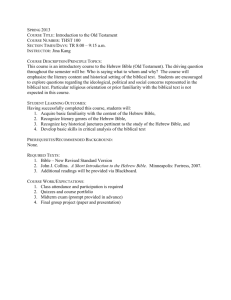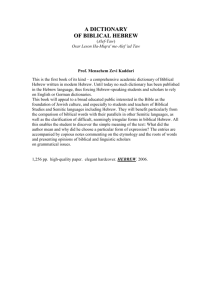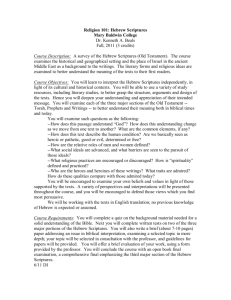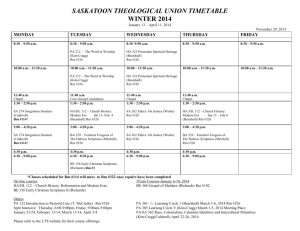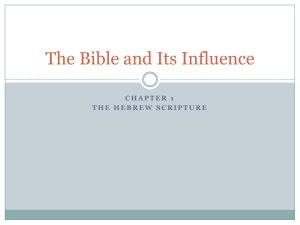SASKATOON THEOLOGICAL UNION COURSE DESCRIPTIONS 2015-16 Biblical Studies
advertisement
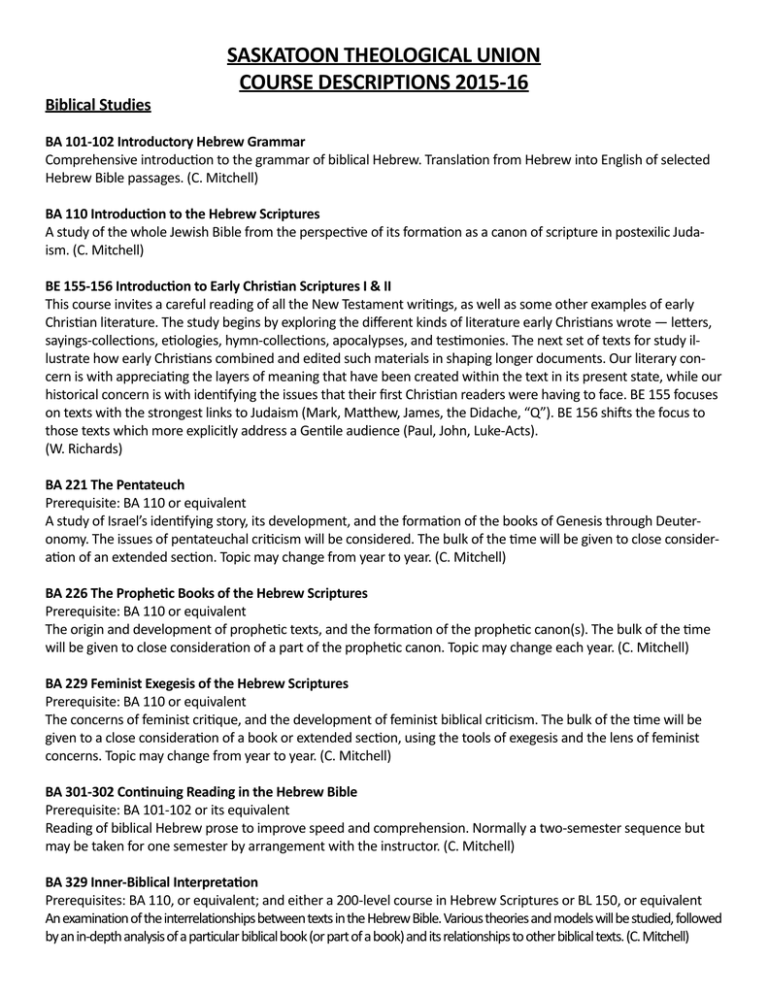
Biblical Studies SASKATOON THEOLOGICAL UNION COURSE DESCRIPTIONS 2015-16 BA 101-102 Introductory Hebrew Grammar Comprehensive introduction to the grammar of biblical Hebrew. Translation from Hebrew into English of selected Hebrew Bible passages. (C. Mitchell) BA 110 Introduction to the Hebrew Scriptures A study of the whole Jewish Bible from the perspective of its formation as a canon of scripture in postexilic Judaism. (C. Mitchell) BE 155-156 Introduction to Early Christian Scriptures I & II This course invites a careful reading of all the New Testament writings, as well as some other examples of early Christian literature. The study begins by exploring the different kinds of literature early Christians wrote — letters, sayings-collections, etiologies, hymn-collections, apocalypses, and testimonies. The next set of texts for study illustrate how early Christians combined and edited such materials in shaping longer documents. Our literary concern is with appreciating the layers of meaning that have been created within the text in its present state, while our historical concern is with identifying the issues that their first Christian readers were having to face. BE 155 focuses on texts with the strongest links to Judaism (Mark, Matthew, James, the Didache, “Q”). BE 156 shifts the focus to those texts which more explicitly address a Gentile audience (Paul, John, Luke-Acts). (W. Richards) BA 221 The Pentateuch Prerequisite: BA 110 or equivalent A study of Israel’s identifying story, its development, and the formation of the books of Genesis through Deuteronomy. The issues of pentateuchal criticism will be considered. The bulk of the time will be given to close consideration of an extended section. Topic may change from year to year. (C. Mitchell) BA 226 The Prophetic Books of the Hebrew Scriptures Prerequisite: BA 110 or equivalent The origin and development of prophetic texts, and the formation of the prophetic canon(s). The bulk of the time will be given to close consideration of a part of the prophetic canon. Topic may change each year. (C. Mitchell) BA 229 Feminist Exegesis of the Hebrew Scriptures Prerequisite: BA 110 or equivalent The concerns of feminist critique, and the development of feminist biblical criticism. The bulk of the time will be given to a close consideration of a book or extended section, using the tools of exegesis and the lens of feminist concerns. Topic may change from year to year. (C. Mitchell) BA 301-302 Continuing Reading in the Hebrew Bible Prerequisite: BA 101-102 or its equivalent Reading of biblical Hebrew prose to improve speed and comprehension. Normally a two-semester sequence but may be taken for one semester by arrangement with the instructor. (C. Mitchell) BA 329 Inner-Biblical Interpretation Prerequisites: BA 110, or equivalent; and either a 200-level course in Hebrew Scriptures or BL 150, or equivalent An examination of the interrelationships between texts in the Hebrew Bible. Various theories and models will be studied, followed by an in-depth analysis of a particular biblical book (or part of a book) and its relationships to other biblical texts. (C. Mitchell) BA 340 Reading and Research: Hebrew Scriptures Prerequisite: one 200 level course in Hebrew Scriptures Special tutorials designated for senior students in consultation with their professor. (C. Mitchell) BA 349 Thesis Writing: Hebrew Scriptures BA 399 Thesis Writing: Christian Scriptures BU 400 Graduate Seminar: Method In Biblical Studies Prerequisite: introductory courses in Hebrew Bible and New Testament, at least one 200-level and one 300-level Bible course, or approved equivalents to these, at least one introductory level biblical language. This course is designed to give the graduate student an adequate understanding of current methodological discussion in biblical studies. The emphasis will be on methods which have been developed recently, or which have undergone major change in recent times. More traditional methods, which the student should already have encountered in exegesis courses, will also be reviewed. (C. Mitchell)
